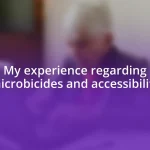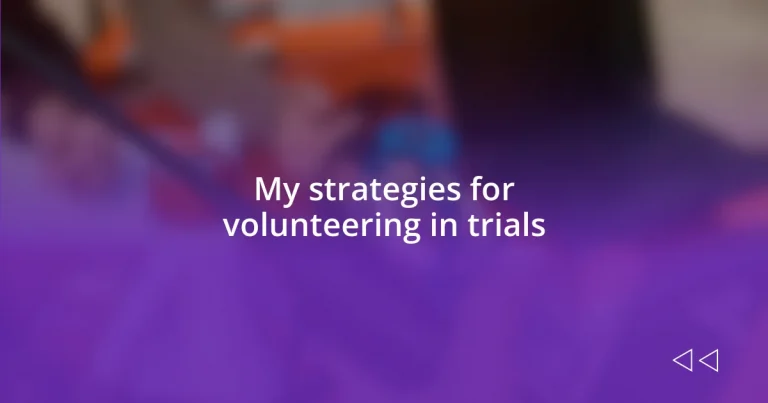Key takeaways:
- Volunteering in clinical trials offers personal growth, access to new treatments, and the opportunity to contribute to significant medical research.
- Proper preparation, including understanding the trial process and communicating openly with the research team, is vital for a positive experience.
- Post-trial experiences involve emotional transitions and maintaining connections with fellow participants, which can enhance the sense of community and continued contribution to medical advancement.
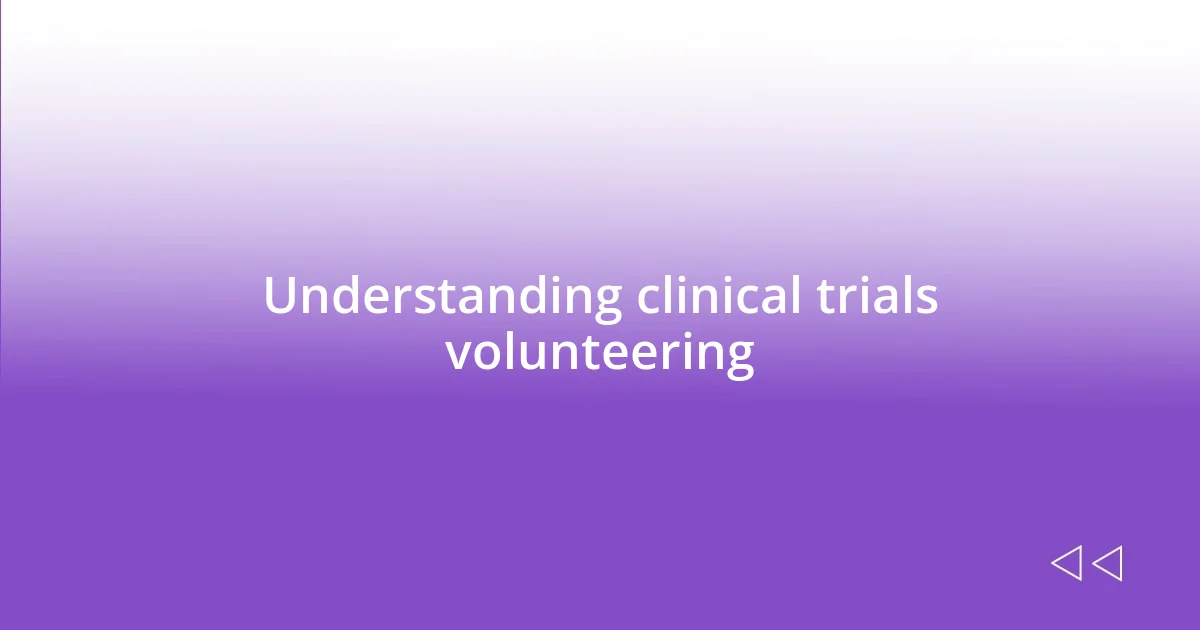
Understanding clinical trials volunteering
Volunteering for clinical trials can initially feel daunting, but it’s also an opportunity to contribute to groundbreaking medical research. I remember my first experience; I was filled with a mix of excitement and anxiety. Would the study be safe? How would the process unfold? These questions echoed in my mind, but I soon learned that such trials are conducted under strict ethical standards and oversight, often offering a chance to receive cutting-edge treatments.
Understanding the purpose of clinical trials is crucial. They help researchers find new ways to treat diseases and advance medical knowledge. I often think of trials as experiments where the stakes might seem high, but they are conducted with volunteers like us at the heart of the process. Have you ever considered how your participation could lead to breakthroughs that may benefit countless patients in the future?
It’s normal to have concerns about side effects and the commitment involved. When I decided to volunteer, I did thorough research but also spoke to previous participants. Their stories shed light on the supportive environment of trials, making me feel that I was part of something bigger. This sense of community motivated me and reassured me that my contribution mattered. Understanding this aspect can make all the difference in how you approach volunteering.
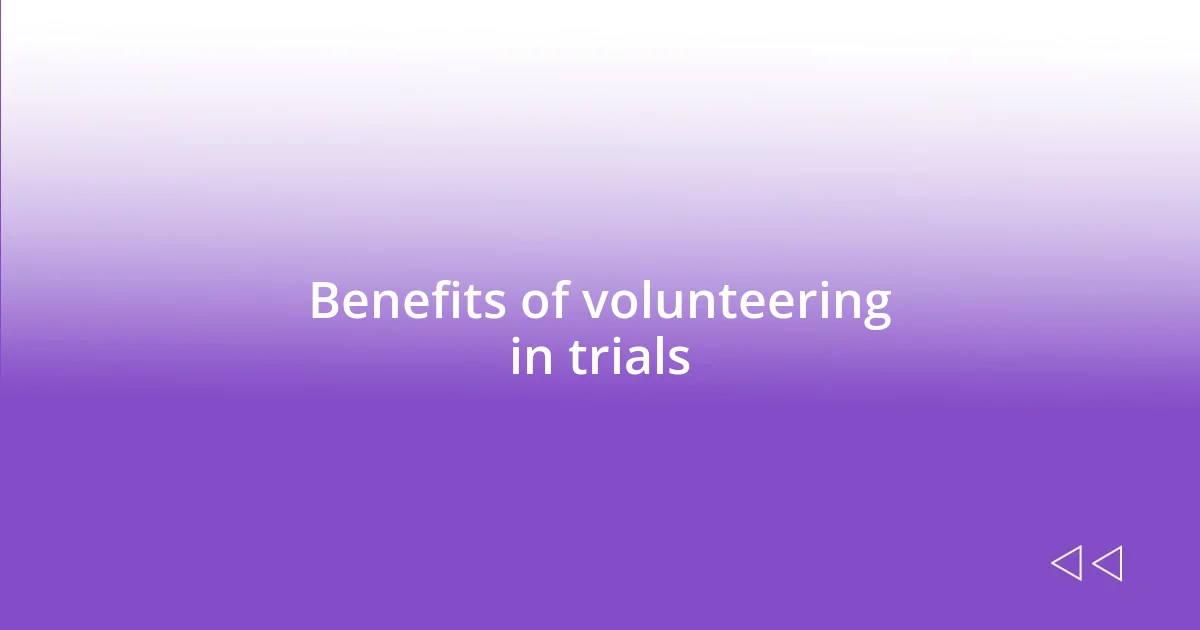
Benefits of volunteering in trials
One of the most rewarding aspects of volunteering for clinical trials is the personal growth and learning that comes with the experience. I vividly recall the sense of accomplishment I felt after completing my first trial. It wasn’t just about contributing to science; I gained invaluable insights into my own resilience and adaptability. Being part of a team working toward a common goal can be incredibly empowering, helping to develop skills that extend beyond the trial itself.
- You contribute to cutting-edge research that may change lives.
- You gain access to new treatments and advanced medical care.
- The experience can enrich your understanding of medical research and ethics.
- Volunteering often leads to connections with healthcare professionals and fellow participants.
- The process enhances your personal growth, fostering skills like communication and teamwork.

How to find suitable trials
Finding the right clinical trial to volunteer for is crucial, and it starts with understanding your own health conditions and interests. I’ve often found that making a list of what I’m looking for helps narrow down potential trials. This clarity allows you to understand whether a trial aligns with your health goals or if it might be outside your comfort zone.
Another effective strategy is to utilize clinical trial registries and databases, like ClinicalTrials.gov. I often spend an afternoon browsing through these sites, which provide detailed information about ongoing studies. By filtering trials based on location, condition, and phase, I can quickly see which options best fit my circumstances.
Lastly, connecting with healthcare providers can open doors to finding suitable trials. I’ve learned that simply discussing my interest in clinical trials with my doctor has led to invaluable recommendations. They can often point you toward specific studies that fit your profile, helping you make informed decisions while keeping safety in mind.
| Method | Description |
|---|---|
| Self-Assessment | Understand your health needs and goals to identify suitable trials. |
| Online Registries | Use databases like ClinicalTrials.gov to search for trials by criteria like location and health conditions. |
| Consulting Healthcare Professionals | Talk to your doctor or specialist for recommendations on relevant ongoing trials. |
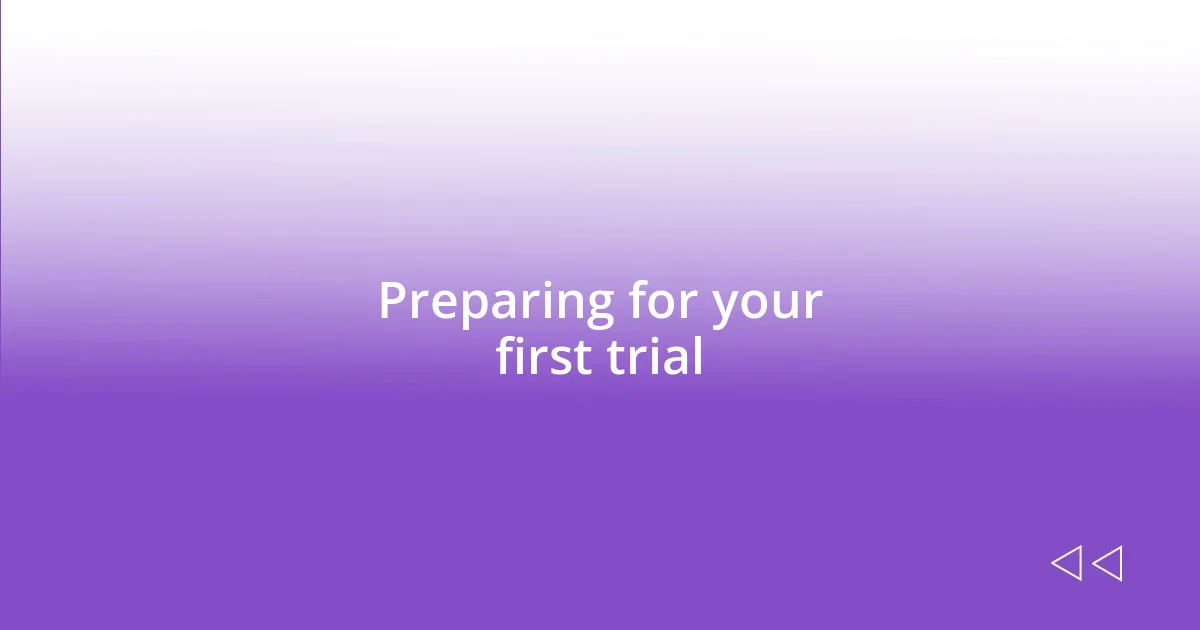
Preparing for your first trial
Preparing for your first trial can feel overwhelming, but breaking it down makes it manageable. I remember feeling a mix of excitement and nervousness before my first experience. Taking some time to gather all necessary information, like understanding the trial’s purpose and procedures, helped ease my mind and set a solid foundation.
Next, it’s essential to familiarize yourself with the consent process. This step ensures you fully understand your role and the potential risks and benefits involved. I once had a moment where I hesitated during a discussion about risks, but asking questions allowed me to approach my decision with confidence and clarity. How can you be sure you’re making an informed choice? Simply, by advocating for yourself and seeking clarification wherever needed.
Lastly, consider speaking with previous trial participants. Their insights can provide a perspective that official materials might not capture. When I networked with fellow volunteers, their stories gave me a deeper sense of community and grounded my expectations. It made me realize—wasn’t this journey about connecting with others while making a difference? For me, that realization transformed any lingering apprehension into anticipation.
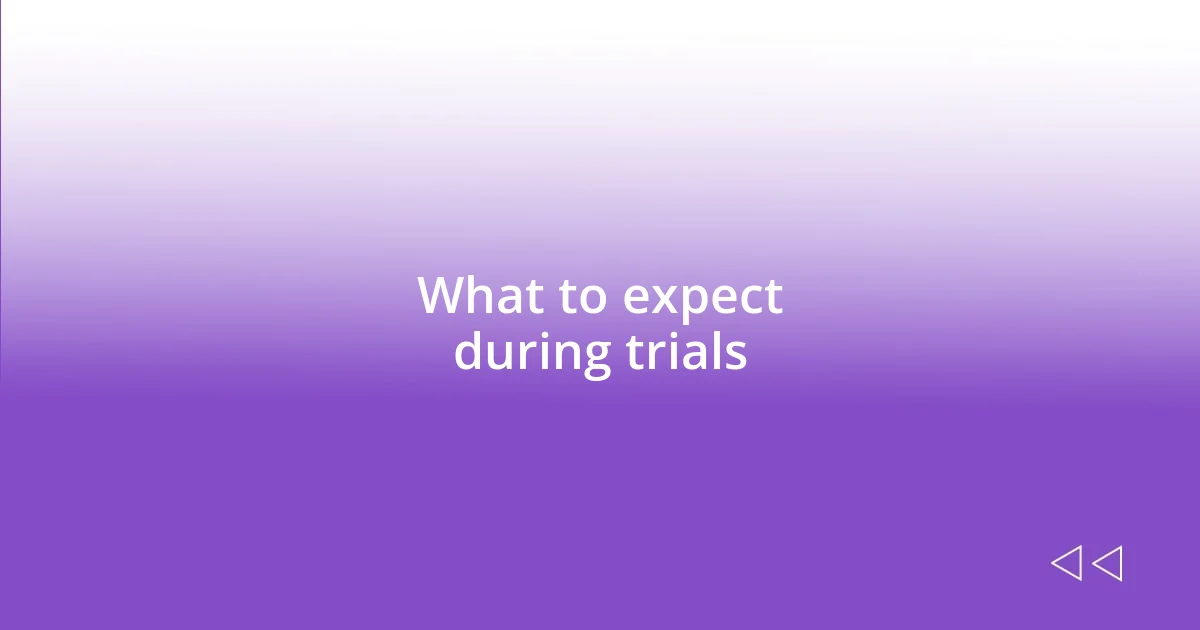
What to expect during trials
Going into a clinical trial, I generally found it helpful to know that diverse experiences await. From my first experience, I remember the atmosphere buzzing with anticipation and curiosity. Each participant brought a unique story to the table, and it was fascinating to share those moments of vulnerability while pursuing the same goal: contributing to medical advancement.
What surprised me most during the trial was the level of engagement from the research team. The constant communication and check-ins made me feel valued and supported. It’s not just about collecting data; I felt like part of a community. Have you ever felt how comforting it is when someone genuinely checks in on your well-being? That level of connection can really bolster your confidence as you navigate the unknowns.
While the trial may come with routine appointments and assessments, I found that these meetings offered invaluable opportunities to reflect on my health journey. I often took the time afterwards to jot down my feelings about the experience, which helped me process everything. Looking back on it, I realized just how powerful it is to be engaged in both your own health and the collective pursuit of knowledge.
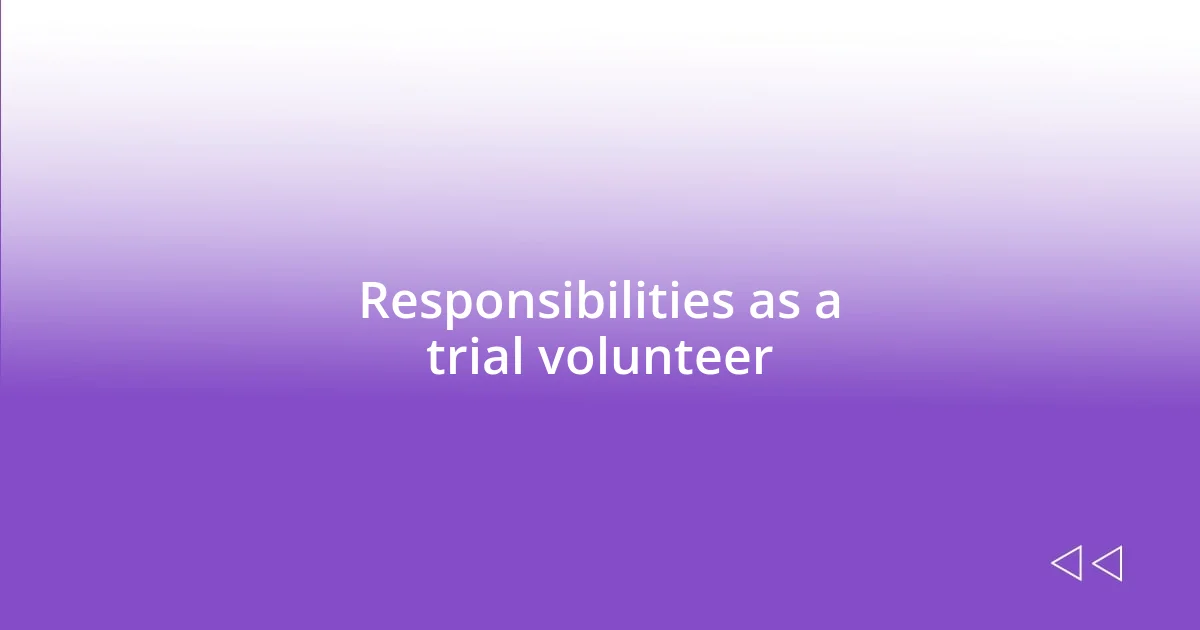
Responsibilities as a trial volunteer
As a trial volunteer, one of my primary responsibilities was to maintain open communication with the research team. I remember one instance when I felt a strange side effect after a dose, and instead of brushing it off, I reached out for guidance. It was reassuring to know that my input was not only welcomed but often critical to the study. This relationship fostered transparency and trust, making it essential to voice any concerns or experiences you might have.
Being punctual and committed to each scheduled appointment was another key responsibility I held. I learned the hard way that missing an appointment not only disrupted my own schedule but could also set back the trial’s progress. This environment taught me accountability; after all, how could I expect the process to yield meaningful results if I didn’t fully commit? I truly felt that each time I showed up, I was contributing to something larger than myself.
Lastly, following the guidelines provided by the research team was crucial. There were times when I found myself tempted to deviate from instructions, especially around dietary restrictions or medication adherence. I quickly realized that I couldn’t underestimate their importance—these guidelines were designed not just to protect me, but to ensure the integrity of the trial. Have you ever paused to consider how each small choice can impact a broader goal? My experience highlighted how being diligent in my responsibilities was pivotal to the success of the research.
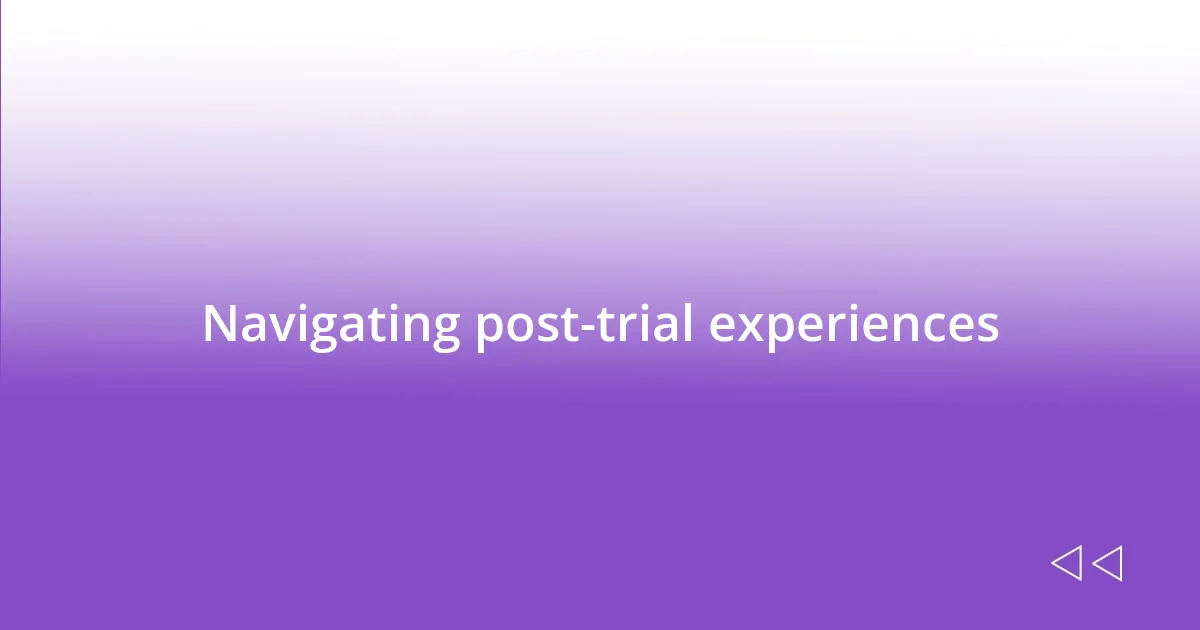
Navigating post-trial experiences
After the trial wraps up, navigating the post-trial experience can feel overwhelming. I remember walking out of the final appointment feeling a mix of accomplishment and confusion. What happens next? Whether it’s understanding follow-up care or accessing trial results, these questions can linger. It’s essential to reach out to the research team, as they are excellent resources to clarify any uncertainties and offer guidance on what to expect moving forward.
One of the most unexpected aspects of my post-trial experience was the emotional transition. It’s easy to get wrapped up in the thrill of being part of something meaningful, so adapting back to daily life felt like a challenge. I often found myself reflecting on what I learned during the trial; it was a time of personal growth. Have you noticed how stepping outside your comfort zone can fundamentally shift your perspective? Taking time to journal or talk with fellow volunteers helped me process my feelings about both the experience and its conclusion, creating a sense of closure.
Lastly, there’s the matter of finding community after the trial. I sought ways to stay connected with other participants, attending support groups or online forums focused on shared experiences. It was comforting to exchange stories and insights, realizing that our journeys continued even once the trial ended. How do you maintain those connections? For me, this bond served as a reminder that our contributions were more than just data points; they were part of a larger narrative in the quest for medical breakthroughs.


